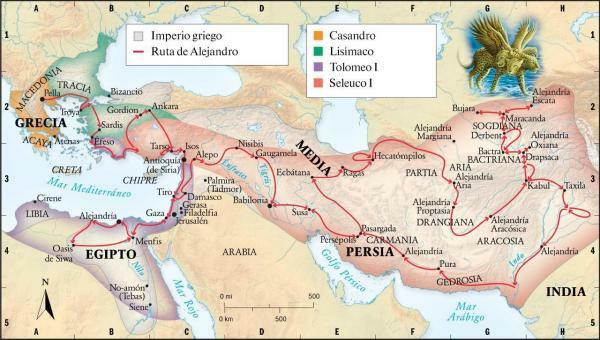Greek Empire: short summary

In this lesson from a TEACHER we are going to discuss Greek empire. This will be a colonialist empire in the beginning, that is, we will find from a very early time the need on the part of the Hellenes to leave their habitat and go to other lands in search of raw materials that their home did not have or the quantities were minimal. For this reason we will find the installation of many colonies throughout the Aegean (Mediterranean), thus becoming a very important mercantile empire. Keep reading and discover a short summary of the Greek Empire, one of the most important empires of our antiquity.
Index
- Causes of the need for colonies
- How a colony was founded
- The map of the Greek Empire
- Characteristics of the Greek Empire
Causes of the need for colonies.
We start this short summary of the Greek Empire discovering why this desire to colonize. One of the causes was the so-called Stasis, or what is the same, a series of differences between the population that if not resolved quickly could lead to a civil war within the polis.
This could be given on many occasions by the ambition of new aristocrats to obtain more power, or on the contrary by the anger of the people due to the bad government exercised by the powerful. In many cases the lack of provision or what is the same, hunger, was the element paramount for this to occur and a solution was to send the surplus population to colonize new land.
On the other hand we will find the business needsIn other words, the city-states needed some raw materials that were not in their domains, it was therefore necessary to look elsewhere in the Aegean to bring them. Hence, free ports were first founded to trade with indigenous or local populations and more later create a series of colonies to be able to trade with these new populations and supply the metropolis.
How a colony was founded.
Colonies were founded in a very determined way. In the first place the oracle approval for the construction of the new city, that is, the gods had to be in favor of this.
The place should have access to the sea (We know that the Greeks were great navigators), it also had to be on a promontory easy to defend from attacks (they usually chose islands off the coast) and a fundamental element was that there were indigenous peoples nearby to be able to trade with them.
Finally, the sacred fire was to be brought with the new settlers, in addition to a part of the aristocracy that would be the elite that would direct the future of the new polis and a sacred rite should also be performed during construction.
After this we know that commercial exchange At first they were very modest, but over time they would acquire great importance for the metropolises. We have to be clear that they did not depend at all on the metropolis in their political life, being therefore an independent city.
In this other article by a PROFESSOR we will discover the most important gods of Greek mythology.

The map of the Greek Empire.
We continue with this short summary of the Greek Empire discovering the map of said empire. Let us now go on to describe the different foci of action of the Greeks in the search for new materials. In the beginning, during protohistory, that is, when writing did not yet exist, the Greeks began to settle mainly on the Anatolian coast.
In a second moment and the best known, it would be the stage known as the “colonization”, In which we will find the Hellenes throughout the Mediterranean, having to highlight the importance of Magna Grecia in Italy.
In the same way it was the moment in which they were also installed in the Iberian Peninsula. This would occur during the VIII-V centuries BC. C. Little by little we know that the relations between the surrounding colonies were becoming very strong and that their trade was very beneficial, being the most productive Magna Grecia and the colonies of the Peninsula, since the dealings with the different indigenous groups benefited these cities.
Map: jw.org

Characteristics of the Greek Empire.
We have to be clear that, although we can define this situation as the Greek Empire, there was never a unity between the different city-states or cops and much less as we have seen between the metropolises and their colonies. That is to say, although they all considered themselves Greek because they had the same language and the same culture, they considered themselves free from each other, making it very difficult to speak of an Empire.
We will only find one unit with the arrival of Alexander the Great, at which time all the Greek polis were annexed to form an Empire, which would last as long as the life of said character lasted, because as We know, after the death of this there were a series of internal wars that ended up giving as a consequence the disintegration in Hellenic kingdoms of all the Empire.
In the same way also say that, although with Alexander the Great many of the Greek cities were united, this alone would affect the East, leaving out of these Magna Grecia and the colonies in North Africa and the Peninsula Iberian.
In this other article by a PROFESSOR we discover a short biography of Alexander the Great.
If you want to read more articles similar to Greek Empire: short summary, we recommend that you enter our category of Story.


